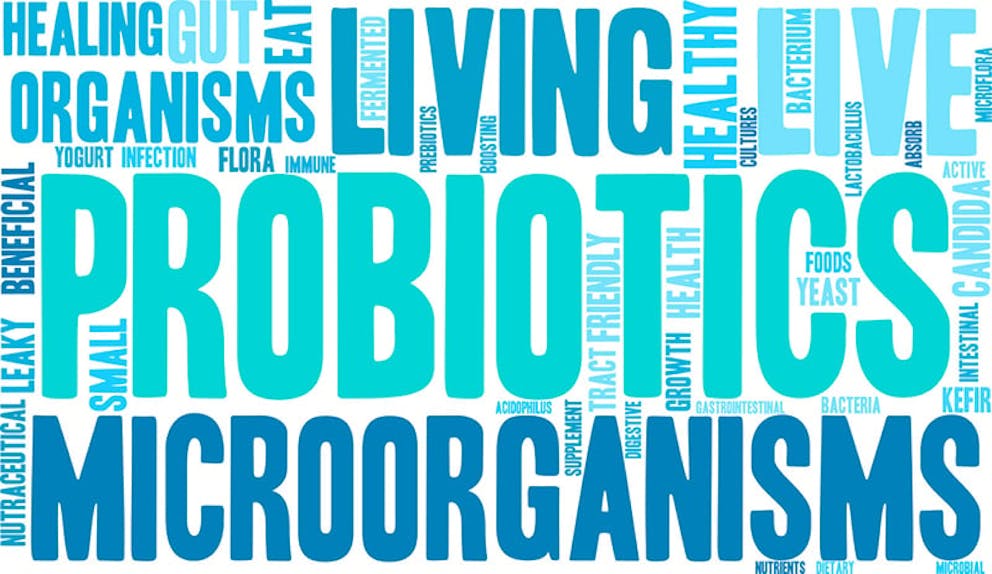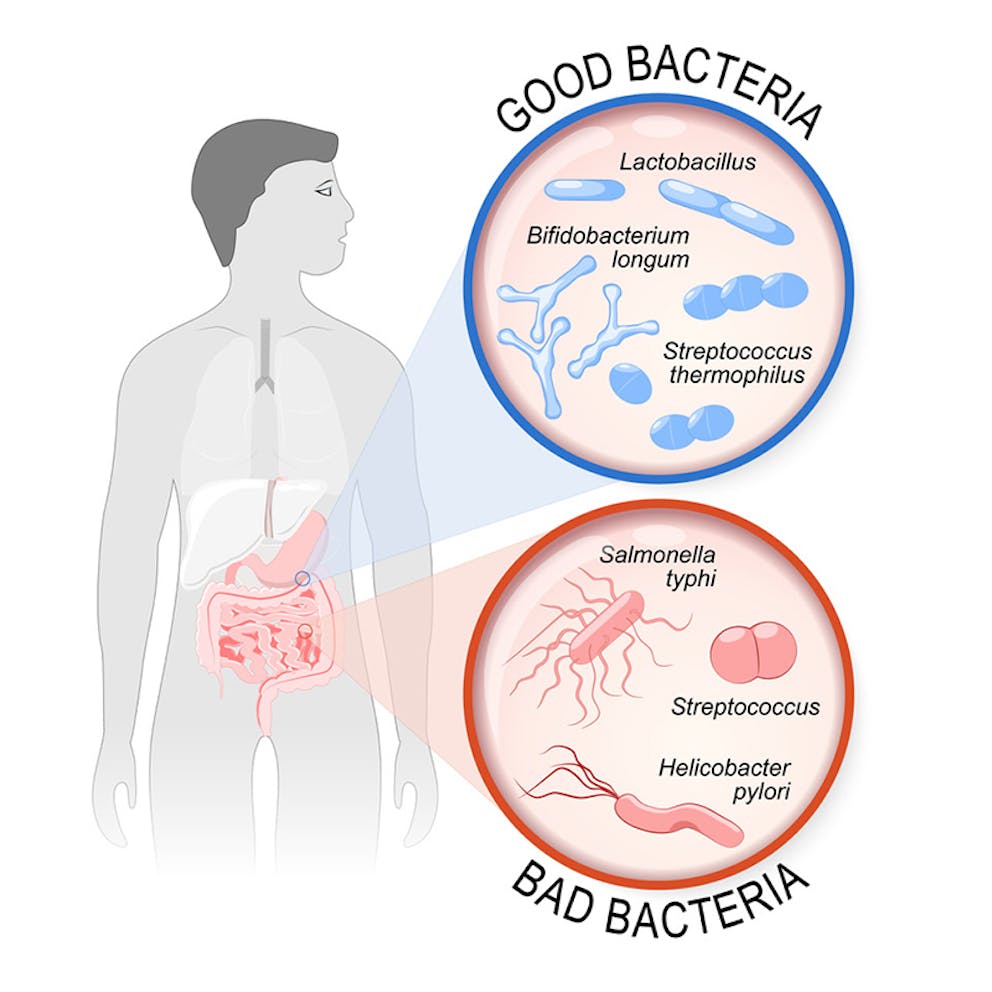Benefits of Probiotics That You Never Considered
You've probably heard of probiotics. But did you know that probiotic health benefits can extend far beyond your digestive system? They can impact everything from your skin to your mood to your blood sugar.
In this article, I will cover:

What are probiotics?
There are all sorts of bacteria living in our bodies. While some of these can be harmful and cause problems in the body, others are actually really good for you. These bacteria are what we refer to as probiotics.
Probiotics are the friendly bacteria in your body that you want around. They perform important functions in the body that keep you healthy.
Probiotic supplements allow you to boost levels of these friendly bacteria. Some of the common types of good bacteria you want more of include lactic acid bacteria (Lactobacillus) and Bifidobacterium.

The more well-known benefits of probiotics
If you have heard of probiotics before, you've likely heard of many of the health benefits.
Most people know that probiotics can...
Help with digestion.
The decrease in inflammation.
Support gas and bloating.
Fight pathogens and boost the immune system.
Digest fiber.
Make vitamins like biotin and vitamin K.
These health benefits can have wide-ranging effects in your body. You might be surprised by how much good can come out of balancing the bacteria in your gut.
People use probiotic supplements for a wide range of common conditions. For example, you might take them for irritable bowel syndrome or diarrhea.
But the benefits of these microbes extend far beyond the shortlist above.

Other probiotic benefits you might not be aware of
There is a lot of info out there on probiotics. So you've likely heard about some of the more well-known health benefits like supporting the digestive system or boosting your immune system. But there are a lot of other benefits of good bacteria like Lactobacillus that aren't as well known.
Did you know that friendly probiotics can also impact things like your mood, your skin, and your blood sugar?
Check out this list of impressive probiotic benefits that you might not have ever considered.
1. Decreasing stress.
How could gut bacteria impact your stress levels?
It turns out that there is a gut-brain connection. This means that the microbes in your microbiome can actually impact your brain. And as a result, they can influence your mental state.
For example, microbes in your digestive tract make amino acids. Amino acids serve as the building blocks for neurotransmitters. Those are the chemical messengers your brain cells use to communicate. And they are tightly involved in mood regulation. L-tryptophan, for example, is an amino acid that can help lower stress.
By making sure you have enough friendly bacteria in your gut, you just might be able to support your stress levels and feel better.
2. Elevating your mood.
It might be hard to believe, but your gut flora can actually impact your mood. So you can support your mood by giving your body more friendly bacteria.
As mentioned above, gut microbes make the amino acids that serve as building blocks for the brain's chemical messengers. L-tryptophan is one example. It can be made into serotonin – a neurotransmitter that boosts mood.

3. Improving sleep.
Another benefit of the gut-brain connection is that your gut microbiome can impact your sleep. The microbes in your digestive system make amino acids that can be turned into melatonin. And melatonin helps to regulate your sleep-wake cycle.
If you have trouble sleeping, probiotics are worth a try.
4. Helping acne and skin problems.
If you have skin issues like cystic acne, dry skin, or flaky skin, probiotics might just help.
The balance of good and bad bacteria in your body is important when it comes to managing skin issues like acne. In fact, one of the common mistakes when treating acne is using antibiotics. Those kill off all of your friendly bacteria along with the bad bacteria. And that isn't a good thing for your skin health.
To learn more about natural ways to eliminate your acne, watch this video.
5. Supporting blood sugars.
Probiotic supplements can also help to balance your blood sugars. But how?
Microbes live off of fiber. And the fiber that is broken down by your gut flora turns into small-chain fatty acids. One of those fatty acids is called butyrate. In this video, I explain how microbes produce butyrate when digesting fiber.
Butyrate is important for your colon and digestion. It can help if you have digestive problems like irritable bowel syndrome. But it also helps to support your blood sugars. Butyrate helps to lower blood sugars and Fat Storing Hormone, and it can help support Fat Storing Hormone resistance as well.
6. Decreasing body odor.
Another bonus of probiotic supplements is that it can help decrease body odor. Sometimes, external symptoms like body odor are a sign of an imbalance in the body.
Lactic acid bacteria (Lactobacillus) are natural deodorizers. Providing your body with the right amount of friendly bacteria can create internal balance and help fix issues like body odor.
7. Improving sinuses.
Probiotics are great for your immune system. And they are great for your mucous membranes, too. So if you are having trouble with your sinuses, boosting your friendly bacteria is worth a try.
8. Supporting weight loss.
An imbalance in gut bacteria can contribute to weight problems. When we have too many bad bacteria and too little friendly bacteria, we can get cravings and hunger which leads to weight gain. That is why antibiotics can be linked to weight gain.
Bringing things back into balance by giving your body a probiotic supplement may help to support your weight loss efforts.

Choosing a probiotic supplement
As you can see, having the right amount of friendly gut bacteria can do some really good things for your body. From helping your skin to improving your sleep, the potential benefits are wide-ranging.
So how can you help to boost the levels of good bacteria in your body? One option is to take a supplement. There are lots of supplements out there to choose from, however.
Here are some tips to keep in mind to help you choose a quality product:
Opt for a liquid form.
Choose one that survives the acidity of the stomach. Many products can be destroyed by stomach acid.
Look for a wide variety of strains. Lactobacillus and Bifidobacterium are two words to look for.
Go for high-quality products that use natural ingredients.
Personally, I like to use my very own Friendly Bacteria Probiotic Liquid.
Tips for taking a probiotic supplement
When taking a supplement, start off with just a little and increase your dose slowly.
Some people can end up with side effects and detox symptoms if they take too much too fast. So take a small amount, and work your way up to about a tablespoon or so.
If you do find yourself having any reaction or side effects, back off and take less until your body gets used to it.
Taking your dose before bed is a great option. For one, it might support better sleep. And also, your body can process any reactions it might have while you are sleeping so you won't even notice them.
Other ways to boost your microbes
Supplements aren't the only option.
Other helpful habits to boost your microbes include:
Eating fermented foods. These are "live" foods that contain good microbes like Lactobacillus. Options to try include things like sauerkraut, kefir, kimchi, and more.
Consuming prebiotic foods. Prebiotics are not the same thing as probiotics. They are actually the food that friendly bacteria live off of. Prebiotics contain a certain type of fiber that microbes love. Some examples include garlic, onions, asparagus, leeks, dandelion greens, and cultured veggies.

Conclusion
Did you know about these unique health benefits of probiotics? It turns out that your gut bacteria are important for much more than just your digestive health.
They can have a positive impact on many different things. These include:
Stress.
Mood.
Sleep.
Skin issues like acne.
Blood sugars and Fat Storing Hormone.
Body odor.
Sinuses.
Weight loss.
So why not take good care of your gut flora? Find a high-quality supplement, eat more fermented foods, and boost your intake of prebiotics.
Do you take a probiotic? What benefits have you noticed? Share your thoughts in the comments section below.
Up Next: -
Disclaimer: Our educational content is not meant or intended for medical advice or treatment.Editor’s
Note: This post has been updated for quality and relevancy.
Previous blog
Intermittent Fasting Patterns for Different SituationsTags

Popular
08/21/2024
43.6K views
05/22/2024
39.1K views
11/18/2024
227.8K views
03/18/2024
11/21/2022




